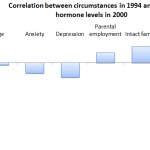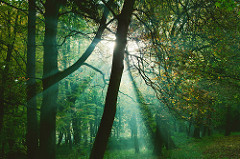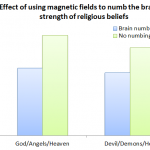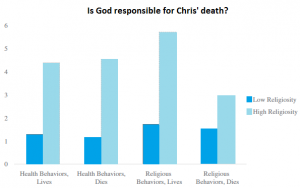Evidence is building up that, because religion helps people to deal with uncertainties of life, it’s particularly attractive to the kind of people who have a hard time dealing with uncertainty.
But what about atheists? Some atheists seem rather fixed and absolutist in their beliefs. Perhaps they use atheism as a prop in much the same way that others use religion.
To test this idea, Malgozata Kossowsk (Jagiellonian University, Poland) and colleagues ran a study on 116 local young adults (average age 22) – just under a quarter of whom were university educated, and about 13% were non-believers. So a pretty representative sample of the population.
They first asked them to complete a bunch of questionnaires on-line, which measured how intolerant they were of uncertainty, how dogmatic they were in general, and specifically about their religious and non-religious beliefs (in particular, whether they thought that their world-view was the only correct one).
If they agreed with statements like “Only the major religious traditions guarantee admittance to God” then they were marked as religious dogmatists, and if they agreed with statements like “Faith is an expression of a weak personality” they were marked as dogmatic atheists.
In a series of analyses, what the researchers found was that there was a definite pathway. People who were intolerant of uncertainty were more likely to have dogmatic beliefs and, in turn, were more likely to either be religious or atheistic dogmatists – as shown in the figure.
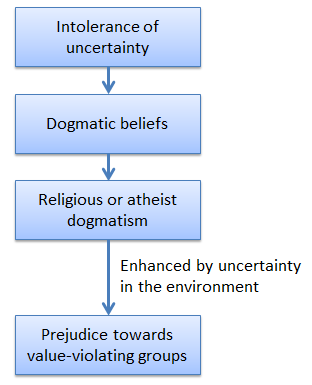
Then they invited their subjects into the laboratory for what they were told was a personality questionnaire. Half of them were asked questions that made them reflect on the uncertainty in their lives. For example, they were asked whether they agreed with statements like “In my life there are situations when I felt a lot of stress because of uncertainty”, and “Sometimes I cannot sleep at night if I do not know what might happen the next day”.
The other half were given more neutral statements, ones that were easy to answer and so should have reinforced their self-certainty.
Then they asked them about their prejudices. For example, what they thought about homosexuals or anti-abortionists (pro-lifers).
Dogmatic believers and atheists were, as you might expect, more likely to support prejudiced attitudes towards the ‘other’ side. But, for both groups, the level of prejudice increased when they experienced uncertainty.
So it seems that dogmatic atheists, like dogmatic believers, reinforce and retrench their beliefs as a way of dealing with a complex and uncertain world.
Although dogmatism and intolerance are both responses to uncertainty, and dogmatic religion and dogmatic atheism have certain similarities, that doesn’t mean that atheism and religion are straightforward mirror images.
For a start, it’s not at all clear what proportion of atheists have dogmatic beliefs, or what proportion of religious people do. The current study doesn’t explore that in their sample, which anyway might be different from the population at large.
However, it seems likely that religion is going to attract people who cannot tolerate uncertainty. After all, one of the major features of religion is it provides answers to imponderable questions – as well as reassurance that a god has a plan for you.
And what limited research there is does suggest that atheists do tend to be a little less dogmatic than Christians. Atheists also tend to be freethinkers – they’re sceptical and tend to deviate from conventional beliefs. Surprisingly, the same research suggests that this psychological trait is actually linked to greater dogmatism!
That may change in the future, as atheism becomes more common in many countries. That may also lead to a rise in intolerant forms of atheism – or indeed, a decrease.
But whatever the future holds in terms of the balance between religion and atheism, this research suggests that dogmatism is here to stay!
![]() Kossowska, M., Czernatowicz-Kukuczka, A., & Sekerdej, M. (2016). Many faces of dogmatism: Prejudice as a way of protecting certainty against value violators among dogmatic believers and atheists British Journal of Psychology DOI: 10.1111/bjop.12186
Kossowska, M., Czernatowicz-Kukuczka, A., & Sekerdej, M. (2016). Many faces of dogmatism: Prejudice as a way of protecting certainty against value violators among dogmatic believers and atheists British Journal of Psychology DOI: 10.1111/bjop.12186







